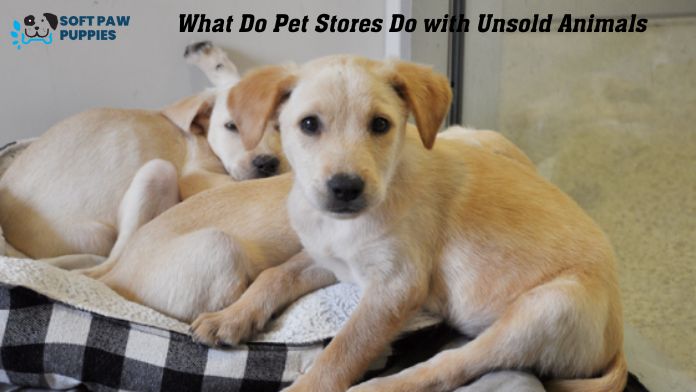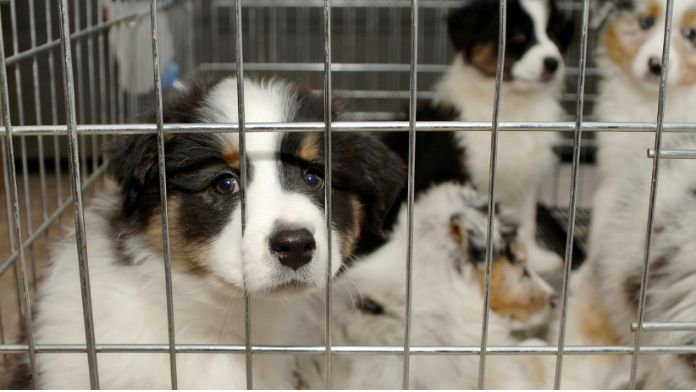
Pet stores are crucial in connecting people with their furry or feathered companions. However, a common concern among animal lovers is what happens to unsold animals in pet stores. In this comprehensive article, we will delve into pet stores’ ethical and responsible practices when dealing with unsold animals. We will provide insights based on firsthand knowledge and credible sources to illuminate this important topic.
Pet Store Puppies: Why You Shouldn’t Rescue One

It’s distressing to see puppies in pet store cages, which is why many people want to “rescue” them by buying them. The cycle of thousands of puppies being raised in puppy mills & then sold in stores is continued by pet store sales, notwithstanding the good intentions of these customers. So, “rescuing” a puppy from a pet store contributes to the expansion of puppy mills.
Every puppy sold results in the ordering of further puppies. Like any other retail establishment, pet shops have inventory, and puppies are a component. When you enter a store and spot a dejected-appearing dachshund puppy, you buy her to get her out of there, and the business orders another dachshund puppy.
The shop sees your thoughtful purchase of pet store puppies as a desire for that breed. You unintentionally contributed to the continued operation of a commercial breeder, broker, and pet shop.
Petco Throwing Away Live Animals
Petco is a well-known pet supply retailer that typically sells a variety of pets, including fish, small mammals, reptiles, and birds. The company is expected to adhere to ethical standards and legal regulations regarding the treatment and care of animals.
If there have been reports or allegations of Petco mistreating or discarding live animals, it would be a serious concern and should be thoroughly investigated. Animal welfare is a crucial aspect of responsible pet ownership and retail practices.
Individuals who witness or suspect any mistreatment of animals are encouraged to report their concerns to local authorities, animal welfare organizations, or relevant regulatory bodies.
What Does Petco Do With Unsold Animals
Petco, like many responsible pet retailers, has policies and procedures in place to address the welfare of unsold animals. However, specific practices may vary, and it’s advisable to check with Petco directly or refer to their latest policies for the most accurate information.
Traditionally, responsible pet retailers, including Petco, have adopted humane approaches to handle unsold animals. These practices often involve working closely with local animal shelters, rescue organizations, and adoption agencies. Instead of euthanizing or disposing of unsold animals, Petco typically seeks to rehome them through partnerships with these organizations.
But Shouldn’t I Care About Pet Store Puppies?
Yes, but keep in mind that puppies sold as pets are those who have previously left puppy mills. The actual tragedy is that the vast majority of pet store puppies are still being raised in puppy mills, where hundreds of thousands of dogs and puppies exist.
Most of these dogs’ lives are spent in teeny, claustrophobic cages with the sole objective of producing puppies for sale in pet shops. By avoiding purchasing a puppy from a store that sells puppies at any time, you can contribute to the closure of puppy mills.
What Happens to Pet Store Puppies Who Aren’t Sold?
They are put up for sale, just as other unsold stock. Stores purchase puppies for a small portion of what they charge their patrons. The original cost of an eight-week-old puppy in a store maybe $1,500. If no one purchases the puppy, the shop will mark it down as the puppy ages.
Puppies are eventually discounted to the price the business paid the broker for the puppy mill, typically a few hundred dollars. Stores frequently cut their losses and give away puppies to staff members, friends, or rescue organizations if the animal still doesn’t sell.
I Wouldn’t Say I Like the Thought of Those Puppies in The Store. I Still Want to Rescue One.
We advise kind people like you to take a “do not enter” stance. Avoid visiting pet establishments selling puppies, shopping there, or even going in to look. Leave the pet store and visit your neighbourhood shelter to adopt a dog if you want to help puppies and dogs.
Here’s Why you Shouldn’t Buy a Dog From a Pet Store
The main issue with pet shops is that they satisfy the desire for fast pleasure among would-be pet owners. “Want a pet when you wake up? Excellent, drop by and get one right away.
People, don’t do this! If you want a puppy, after doing some study, you will still want one after a few months. Purchasing a dog from a puppy factory impulsively prepares you for a difficult journey.
There is a significant probability that you haven’t had the time or planning to consider all the effort that owning a dog takes if you have decided that you need a puppy right this second and haven’t had the drive or time to plan this “purchase.”
People also purchase purebred animals from pet stores to avoid paying the high fees charged by private breeders, but there is a reason they are less expensive: you get what you pay for! Similar to purchasing a poor imitation handbag. On the outside, it may appear fantastic and pass for what it is meant to be, but the quality could be better, and it most likely will last less time.
Some individuals think purchasing a pet from a pet store is smart because they can choose a breed with the characteristics and temperament they want. Sorry to break the news to you. This belongs in the same category as the imitation handbag.
The dog may have Labrador looks, but let me tell you, his poor little puppy brains are probably so muddled up from being mated with his siblings for years that you would probably stand a better chance with a mutt from the shelter because at least that dog doesn’t have an overlapping DNA strand.
What Do Pet Stores Do with Unsold Animals?
Pet stores are committed to the well-being of the animals in their care, including those who may not find a home immediately.
When faced with unsold animals, responsible pet stores have several options:
The Responsibility of Pet Store Owners
Pet store owners are responsible for ensuring that unsold animals are treated with care and respect. They should prioritize the welfare of animals over profits. This responsibility includes:
- Regular health check-ups for all animals in the store.
- Providing appropriate living conditions.
- Ensuring staff members are trained in animal care.
Adoption Programs and Partnerships
Many pet stores have adoption programs and partnerships with local animal shelters or rescue organizations. This allows them to find loving homes for unsold animals. These programs often involve:
- Screening potential adopters to ensure responsible ownership.
- Providing information about the pet’s needs and care.
- Offering adoption events to promote adoption.
Rehoming Unsold Animals
Responsible pet stores make efforts to rehome unsold animals through various means:
- Offering discounts to encourage adoption.
- Providing resources and information on pet care.
- Keeping unsold animals in comfortable and safe enclosures.
Veterinary Care for Unsold Animals
Pet stores are committed to the health and well-being of their animals. If an unsold animal requires medical attention, it should seek veterinary care promptly. This ensures that even unsold animals receive the necessary medical care.
The Role of Animal Shelters
Pet stores often work closely with animal shelters to find homes for unsold animals. These shelters provide temporary housing and care while actively seeking suitable adopters.
Ethical Breeding Practices
Responsible pet stores encourage ethical breeding practices to reduce the number of unsold animals. This includes:
- Working with reputable breeders who prioritize animal health.
- Educating customers about responsible breeding.
- Promoting spaying and neutering to reduce overpopulation.
Monitoring and Compliance
Government regulations and industry standards are in place to ensure the welfare of animals in pet stores. Store owners must adhere to these guidelines, with regular inspections to ensure compliance.
FAQ
What Do You Do in a Pet Store?
Preparing merchandise orders, banking and other miscellaneous paperwork. Placing small items (under 10 lbs), including pet supplies, household items, etc., into… Pet Care: You’ll ensure the safety of all living pets in our stores—including fish, reptiles, birds, and small animals.
Where Do Pet Stores Get Their Animals From?
Petsmart and Petco stores, and other large chain pet stores, usually get all their animals from mills. Not dogs and cats, but hamsters, guinea pigs, mice, reptiles, and birds. You can see how they are kept, under bright fluorescent lights, in tiny glass boxes with sometimes wire wheels, eating sh*t food.
Are Pet Stores Bad for Small Animals?
Rats, hamsters, reptiles, and other small creatures are kept in pet stores confined to incredibly packed boxes where they frequently have little choice but to stand on one another. Never purchase an animal from a pet shop. Small animals are routinely neglected, and pet retailers are complicit in this.
Conclusion
In conclusion, responsible pet stores take their commitment to animal welfare seriously. Unsold animals are not discarded; instead, efforts are made to find them loving homes. Through adoption programs, partnerships with shelters, and ethical breeding practices, pet stores contribute to the well-being of animals in their care.
Remember that when you adopt a pet from a pet store, you positively impact their lives. Let’s continue to support and promote responsible pet ownership.






